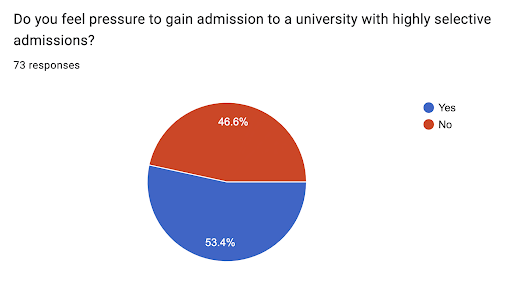With college admissions becoming more selective every year, many students face strong parental pressure to gain admission to these selective schools. While all types of students face at least some type of parental pressure, the pressure that comes with highly successful parents is unique, and is often seen at ISSH.
In a survey sent to ISSH high school students, 50% of respondents answered that their parents attended highly selective universities, and 90% of parents attained a bachelor’s degree or higher. Successful parents often push their children to follow the same path of success as they did. We conducted interviews with two 10th-grade students and an 11th-grade student to determine the effect of parental pressure. These students asked that we not use their names.
“They don’t pressure me into going to the same university as them, but it’s more like ‘get good grades’ or ‘go to a university that matches your capabilities’. It’s not a lot of pressure, but they do expect me to go to a good university,’’ said a grade 10 student.

A grade 11 student said she faces more pressure from her parents to gain admission to an elite school.
“My grandfather went to Harvard so he had high expectations for my parents, especially for my father to go to a good US university, but he stayed in his home country instead. I still have that generational expectation from my grandfather and my parents, so my parents want me to achieve my grandfather’s dream for them.”
Another grade 10 student felt that her parents also expect her to get into a selective university.
“My parents have said ‘if you want to have a good life, or earn a lot, you have to study and work hard to get into a good school.’” Her parents, who attended the University of Tokyo, push her to accomplish the same success.
Parental pressure to get into an elite university often means that students are pushed for opportunities that may increase their chances of university acceptance.
“I definitely get pressure like I should be doing an internship over the summer, I should be studying, I should get really good scores on my SATs, I should be doing summer programs,” said the 11th-grade student.
Many other students also feel a similar pressure for university admissions. In a survey sent out to ISSH high school students, 53% of respondents answered that they feel pressure to gain admission to a university with highly selective admissions. Oftentimes, the pressure around university admission also means that students feel pressure to excel at academics.
“I have an expectation on myself to at least get A’s in every class and do well,” said the 11th-grade student. Additionally, she said, “Because I’m the firstborn, my parents pressure me to set a good example for my sister. They tell me to excel in class so that I can help my sister later, and to get into a good college so I can have that experience before her.”
The 11th grader also said that pressure to get into a top university also applies to future career success: “My parents definitely push me to get a job with a stable income and get hired by a good company.”
Many other students also feel parental pressure in regard to their careers. In our survey, when asked about pressure regarding future career success, 70% of respondents answered that they felt some amount of pressure to be as successful in their career as their parents were.
Although pressure from successful parents isn’t always positive, the interviewed students shared that they felt many benefits came from it.
The grade 10 student said she is “very fortunate due to the success of my parents which gives me a financial advantage.”
“I feel like I definitely have more resources because I live outside of my home country, and I go to an international school, which makes it easier for me to go to the US to study. I also have more access to academic resources than my parents had,” said the 11th-grade student.
According to Inside Higher Ed, “In 1992, the average probability of gaining undergraduate admission to a highly selective institution was more than one in four (27 percent). By 2021, just over one in 20 (6 percent) applicants got into these same schools.”
For students today, it is much harder to gain admission to elite universities than it was for their parents.
Parents should understand the extreme difficulty of getting into an elite institution, and realize that the system has changed from their time. It may benefit both parents and students if they realize that acceptance into a prestigious institution is not the determining factor of success.
As Frank Bruni wrote in his book, “Where You Go Is Not Who You’ll Be”: “the nature of student college experience —the work that he or she puts into it, the skills that he or she picks up, the self-examination that’s undertaken, the resourcefulness that is honed — matters more than the name of the instruction attended. . . .Education is indeed everything, but it happens across a spectrum of settings and in infinite ways. It starts well before college. It continues long after college. College has no monopoly on the ingredients for professional success or for a life well lived.”

















































